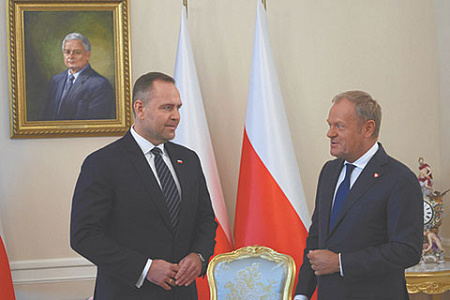
A dramatic escalation in Poland’s protracted political battle unfolded this week as the European Parliament voted to strip immunity from two prominent Polish MEPs, Michał Dworczyk and Daniel Obajtek. This decision paves the way for Polish prosecutors to launch investigations, casting a stark spotlight on the fierce power struggle between Prime Minister Donald Tusk’s liberal Civic Platform and the conservative Law and Justice (PiS) party, which backs President Karol Nawrocki. The move is widely seen as a significant victory for Tusk’s government, determined to dismantle what it describes as PiS’s legacy of institutional capture.
Both Dworczyk and Obajtek are implicated in alleged wrongdoings dating back to the 2017-2023 period when PiS, under then-Prime Minister Mateusz Morawiecki, was in power. Michał Dworczyk, who served as Morawiecki’s chief of staff, is embroiled in a scandal involving the alleged destruction of evidence related to a 2021 email leak. While Dworczyk initially claimed his use of unsecured email for official correspondence contained no classified information, prosecutors now allege he ordered the deletion of data to obstruct justice – a charge elevating the matter from misconduct to a serious criminal offense.
Similarly, Daniel Obajtek, former CEO of state-controlled oil giant PKN Orlen from 2018 to 2024, faces accusations of misusing company funds. Prosecutors claim he engaged the company in detective services for personal rather than corporate interests. Obajtek, like Dworczyk, is a close associate of Morawiecki, even holding a position in the ex-premier’s shadow cabinet, underscoring the deep interconnectedness of these figures within the conservative political establishment.
For Prime Minister Tusk, these developments are crucial to his government’s pledge to restore the rule of law and transparency in Poland. His administration asserts that between 2015 and 2023, PiS systematically manipulated state institutions for partisan gain. This included a controversial overhaul of state media leadership in 2016, placing it under party control, and sweeping reforms to the judiciary in 2017, which saw numerous judges replaced by individuals sympathetic to PiS. The Constitutional Tribunal and the Supreme Court, key pillars of the judicial system, were also brought under significant political influence during this period.
The current political quagmire is further complicated by an open conflict between Tusk’s government and President Karol Nawrocki, who, while not a PiS member, owes his 2025 electoral victory to the party’s backing. Nawrocki and Tusk are locked in public disputes across a range of issues, from domestic policy to international affairs. Their divergent views on Ukraine’s potential EU membership, despite shared support for Kyiv against Moscow, exemplify this rift. Nawrocki’s veto of legislation granting social assistance to Ukrainians prompted Tusk to label the act as ‘treason,’ highlighting the depth of their animosity.
The struggle extends to who represents Poland on the global stage. A notable episode occurred recently when both leaders vied for the opportunity to engage with former U.S. President Donald Trump. Historically, such high-level meetings were Tusk’s prerogative, but since Nawrocki’s election, Trump has shown a clear preference for the President, even calling him (not the Prime Minister) to discuss the U.S.-Russia summit in Alaska. This signals a fragmented foreign policy voice at a critical juncture for European security.
The battle lines are now increasingly drawn in Poland’s courts and prosecutor’s offices. Tusk’s government initiates criminal proceedings against Nawrocki’s allies, framing these actions as a necessary step to restore public trust in a justice system allegedly compromised by PiS. Conversely, presidential forces accuse the Prime Minister of generating judicial chaos and undermining constitutional principles through politically motivated interventions. Critics point to the controversial dismissal and replacement of top prosecutors without presidential approval, raising questions about the legality of these actions under Polish law.
The judicial confrontation intensified with the parliament’s 2024 resolution declaring certain PiS-era constitutional judge appointments illegal. In response, Bogdan Święczkowski, head of the Constitutional Tribunal, accused the Prime Minister and other officials of attempting to subvert the country’s constitutional foundations through ‘attacks on the judiciary and media independence,’ subsequently filing a complaint with prosecutors – a move that ironically mirrors the type of judicial maneuvering Tusk’s government seeks to rectify.
With both sides entrenched, the prospect of a swift resolution appears dim. The political landscape is defined by an ongoing exchange of accusations and legal battles, where neither faction is likely to achieve a decisive victory. While the pro-government coalition holds a relatively slim majority in the Sejm (260 to 218), the President, despite having fewer direct executive powers than the Prime Minister, retains significant capacity to obstruct Tusk’s agenda. This institutional deadlock, with no parliamentary elections for another two years, portends a period of continued instability, impacting Poland’s domestic governance and its role within the European Union.
